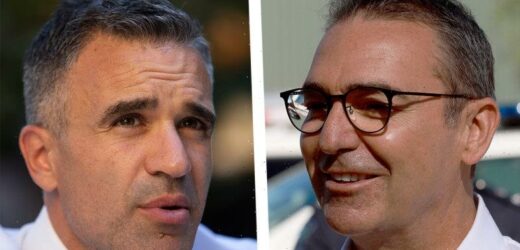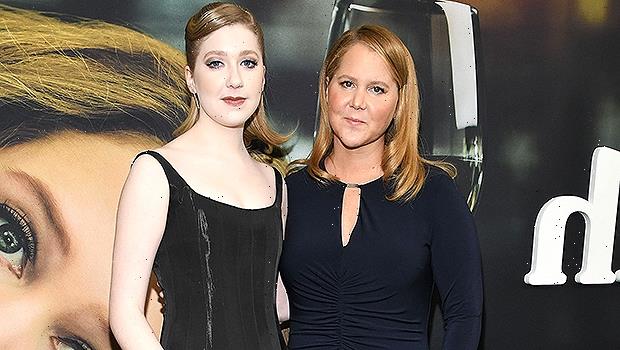Talking points
- South Australia goes to the polls on Saturday.
- Pollsters expect Premier Steven Marshall to lose to SA Labor leader Peter Malinauskas.
- It’ll be the first time Australian voters go to the polls free from COVID-19 restrictions.
The South Australian election campaign has not exactly captured the nation’s attention. But in Canberra, Melbourne and Sydney there will be teams of people watching every development this Saturday.
It will be the first chance Australian voters have had to judge a government with COVID-19 restrictions in the rear-view mirror. It also gives strategists involved in upcoming federal, Victorian and NSW elections the first clues on whether the advantage of incumbency may be dead.
South Australian Premier Steven Marshall and former prime minister John Howard in Adelaide on Wednesday.Credit:AAP
South Australia is prospering. Adelaide is now the world’s most liveable city on the Economist’s Global Liveability Index and the state’s economy is the fastest-growing in the country.
Premier Steven Marshall tells The Age and The Sydney Morning Herald that SA, the state which spent the fewest days in lockdown, is in the midst of an unprecedented period of prosperity and excitement.
The moderate Liberal and Port Adelaide supporter sounds relaxed as he speaks of the state’s “newfound sense of confidence” and his plans to end the state’s “brain drain” and grow its population.
“SA was in the doldrums for 20 years before we came to government. We had an exodus of young people and companies, and we’ve now got net migration and global companies setting up,” he said.
“We didn’t turn the attention on ourselves [during the pandemic] to drive fear. We took a balanced approach to the pandemic, and we’re now the only state other than Western Australia about to return to a surplus.”
But despite his state’s successes, bookies and pollsters expect Mr Marshall, the longest-serving Liberal leader in Australia, to lose his job to SA’s Labor leader Peter Malinauskas when the state goes to the polls on Saturday.
The 41-year-old Catholic and former boss of the right-wing shoppies union is the only opposition leader other than federal Labor leader Anthony Albanese to have kept his job since the COVID-19 pandemic began in 2020.
The footy-playing, Bob Hawke-admiring politician, whose chiselled six-pack received national attention last month, has invited business lobby groups to cabinet meetings if he’s elected and uses creative communication methods to engage voters on social media.
This photo of the SA Opposition Leader Peter Malinauskas attracted national attention.Credit:Twitter
Malinauskas says Marshall’s claims of a prosperous economy are insulting to South Australians. He cites the state’s 4.8 per cent unemployment rate – the worst in Australia – and says the government has lost control of the state’s health system.
“Ambulance ramping is so bad that when people call triple-zero, there’s a very good chance an ambulance won’t be there on time,” he tells The Age and the Herald.
Malinauskas says he has occasionally sought advice from Victorian Premier Daniel Andrews. If successful, he will be another Labor voice at the national cabinet table, where he would back Andrews’ recent call for a structural increase in federal government funding for hospitals.
Tasmania and NSW would be the only remaining states with a Coalition government.
SA Labor leader Peter Malinauskas.Credit:Brett Hartwig
“People who are able to lead oppositions into government are rare and Dan Andrews was able to do that against a first-term conservative government. We want to replicate that,” he said.
Like other opposition leaders, Malinauskas was starved of airtime during the pandemic. Unlike some alternative premiers, this was partly due to his approach. He and NSW Labor leader Chris Minns decided early in the pandemic they would support public health measures and refrain from criticism.
Malinauskas says the approach meant he was often absent from news bulletins, but it would help him maintain his trust with voters.
Polls showed spikes in support for Marshall and his government hit peaks during the pandemic. His popularity has waned in recent months, however, and he now trails Malinauskas as preferred premier.
“Marshall has no substitute narrative post the pandemic”
Malinauskas’ rise bears similarities to other political contests around the country. Albanese and Minns have been gaining ground in various polls and Matthew Guy’s Victorian Liberals speak of promising internal polling. It has political operatives in both major parties wondering if the nation’s incumbents are losing their halo.
Former South Australian Premier Mike Rann, who led the state between 2002 and 2011, believes politics is normalising.
“We’re back to old territory and out of that [COVID-19] mindset. People are asking ‘OK, well, what are you doing for us now and in the future?’,” he said. “Marshall has no substitute narrative post the pandemic.”
“If predictions of a victory for South Australian Labor prove to be correct, it will be another indication that the Victorian and NSW elections are going to be tight contests,” one Labor operative said.
South Australian Premier Steven Marshall. Credit:Alex Ellinghausen
Bipartisanship on pandemic policies ended in SA when Marshall stuck to his plan to reopen the state’s border in late November, just before the threat of the infectious Omicron variant materialised.
Malinauskas backed the reopening but said hospitals and testing infrastructure needed to be ready. Instead, testing sites couldn’t cope with the demand, more people died than forecast, and many were left wondering why the reopening plan wasn’t adjusted to deal with the new variant.
Malinauskas called the reopening a “catastrophe”, but the Premier regrets nothing.
“We opened up at the right time and I’m happy to put our pandemic record alongside anyone else’s,” Marshall says. “There was no option just to keep our borders closed.”
Rann argues Marshall’s management of the Omicron wave caused his leadership to “crumble”.
As one senior South Australian Liberal said: “If this election was pre-Omicron, we’d have shat it in.”
University of SA epidemiologist professor Adrian Esterman agreed the reopening plan was a “big mistake”. However, he gives the government credit for maintaining public health measures like mask-wearing and density limits throughout summer, and for longer into 2022 than other states, which he said limited the number of cases and deaths.
Martin Haese, chief executive of major industry group Business SA, backed the reopening plan: “Omicron did throw SA’s economic recovery a curveball, but we have rebounded a fair way since then.“
On a warm Wednesday at Adelaide’s Modbury Bowling Club, in the key marginal seat of Newland, former Prime Minister John Howard flanked Marshall, talking up his achievements as premier.
He said SA had “come out of the slow lane” and was now “humming”.
“He [Marshall] has put SA back on the national map economically,” the former prime minister said.
Prime Minister Scott Morrison was absent from the final weeks of the campaign. He was due to travel to the state around the time he contracted COVID-19, and his cancellation was met with quiet relief by South Australian Liberals, who believe his unpopularity is a discernible drag on the government. Victorian Liberals believe the federal government is causing a 2 to 3 per cent primary vote reduction for the state opposition.
Just like Howard did in 2007, Marshall faces the risk of losing his own seat. A recent seat-specific poll, which are notoriously inaccurate, suggested his electorate of Dunstan was on the precipice of being lost to Labor.
Ambulance ramping – where ambulances with patients are forced to wait outside emergency departments because of a lack of space inside – has soared under the Liberal government.
Malinauskas and the state’s ambulance union have run a brutal campaign on the issue, and the problems were underscored during election week by the deaths of three people, including a 20-year-old who waited more than 45 minutes for lights and sirens.
“Before you vote please read this,” Malinauskas tweeted in reference to the deaths. “This can’t keep happening night after night.”
At a polling station where voters in Marshall’s electorate cast early votes, a handful of voters spoken to by The Age and the Herald said ambulance ramping was the key election issue for them. But Danny Simons, a Liberal voter from Marshall’s electorate, said the extent of the problem had been “sensationalised a little bit”.
Katie Cooper, a 22-year-old Greens voter, said she believed strain on the health system would decide the election.
Katie Cooper at the Glynde early polling centre.
“It’s insane. You read about it on the news. Just the other day it was a 20-year-old, which is younger than me, and that’s really scary to hear,” she said of the ramping situation.
Malinauskas’ ambulance delays mirrors the effective crusade on the same topic that allowed Victorian Premier Daniel Andrews to defeat the Coalition in 2014 and make it Victoria’s first one-term government.
The Marshall government has pursued a negative campaign against Malinauskas, who they claim “slashed” health services when he was health minister in 2017-18.
The parallels with Victoria are striking. The Victorian Coalition’s recent focus has been on the state’s health system and the role of Andrews, who has been health minister or premier for all but four years since 2007. Victorian Labor figures are closely watching whether a Liberal Party attack on the health credentials of a Labor Party – a rarity because health policy is a traditional Labor strength – can translate into electoral success.
Marshall is also facing blow back from voters in the outer suburbs over his government’s decision to move the Clipsal 500 V8 Supercar race. The event is loved by SA’s revhead community, many of whom worked in the old Holden factory, but disliked by some in the inner-city whose transport routes are disrupted by the event. Marshall also angered some conservatives by supporting abortion and euthanasia reforms.
Malinauskas has pledged to bring the race back to its original site and a South Australian political observer said Labor’s focus on the issue illustrates Marshall’s inability to pitch to suburban voters. Many of the premier’s major achievements – such as renewable energy investment, a $200 million Indigenous art centre and a city precinct for new tech, space and professional services firms – were not the types of practical policies that help win state elections.
The Liberals go into the election with a notional 23 of the 47 lower house seats after defections of government MPs and redistributions, while Labor holds 20. A handful of key seats will decide the election. Polling indicates a statewide Labor swing of about 5 per cent, but the government is clinging to hope that the swing is smaller in the seats that matter.
A loss would put the South Australian Liberals back into their familiar position on the opposition benches. They are one of the least successful major political parties across Australia, having won just four of the last 15 elections.
The Morning Edition newsletter is our guide to the day’s most important and interesting stories, analysis and insights. Sign up here.
Most Viewed in National
From our partners
Source: Read Full Article







